There is no ‘development’ without a living wage

A spectre is haunting Bangladesh—the spectre of "bourgeois terrorism." For months now, the workers that keep the country's largest, most prestigious industry running have been agitating to secure a minimum wage that they can more or less live on. The response has been business-as-usual; the state has unleashed all its repressive powers—including 37 cases filed against over 14,000 workers, many of them unnamed, in Dhaka, Gazipur, Savar, and Ashulia, and police opening fire on them, which has already killed at least four workers. Labour organisers and activists are disappearing, while workers are being fired for speaking to the media.
Meanwhile, the so-called wage board, after a seven-month delay (surely intended to align with the election season) and a farcical proposal of Tk 10,500, has settled on a Tk 12,500 minimum wage. This proposal—which, as others have pointed out, is simply the factory owners' voice filtered through the legitimising device of the "board"—does not even come close to the Centre for Policy Dialogue's conservative suggestion of a Tk 17,500 wage, let alone the Tk 23,000-Tk 25,000 that workers, unions, and labour organisations have been demanding for years.
Accompanying this farce has been the usual stream of rationalisations: "small factories," "low productivity," "double incomes," "troublemakers," "low prices," and of course, the ever-imminent threat of industrial and economic collapse that somehow never actually arrives. No matter how many times they are pushed to raise the minimum wage—always at considerable human cost—the industry only seems to prosper, as we are told about night and day, except when it comes to paying workers their due.
Truly, it has become quite impossible to take the RMG industry and what it says seriously. Economists, journalists, and activists have already broken down, in great detail, how misleading and dishonest the state and BGMEA's calculations and narratives are. Intelligent people should not have to be told that a Tk 1,250 food allowance in today's Bangladesh is a prescription for slow starvation. More than anything, moments like this serve as the most vivid illustration of what it means to call the state an instrument of class domination.
How else are we to explain this unwavering support—in the form of lower corporate tax rates and greater tax rebates and exemptions than any other industry, along with a ready supply of brutal force and legal snares—for an industry that still refuses to pay a living minimum wage after over four decades? What else should we call a state that defends the right of the "small factory owner" to do business over the right of workers to afford food; that takes no action against industrialists owing months' worth of wages but hunts down workers accused of "looting;" that punishes workers for coming together while rewarding the owners' union leaders (what else is the BGMEA?) with political office?
Perhaps we should not expect anything else. After all, we are talking about the industry that has long styled itself as the nation's saviour, to the extent that it seems like it is in business out of patriotic duty. Long before the Padma Bridge or the Dhaka metro rail, we had the RMG industry, saving us from poverty and stagnant growth after an apparently misguided and short-lived experiment with socialist planning. It has given us "development," delivered us that national prosperity that we were once promised, and to it we are now erecting monuments. No one can deny, of course, the tremendous role that the industry has played in generating this national wealth, but it has not done so by some magical force of its own. It has ridden the power of labour and no small amount of constant state support—support that has also helped keep that labour cheap and in check. "Garments" have not delivered the people of Bangladesh; it is the people of Bangladesh who have made "garments" possible, along with some considerable personal fortunes. We may have abandoned socialism, but there has been precious little "freedom" in the "free markets" that we have supposedly embraced. And if we can feed this industry with blood, sweat, and taxes year after year, surely we should be able to decide the bare minimum that it pays its workers?
"This independence will only be a true independence to me, when the workers, peasants, and all the suffering people of Bangladesh are delivered from their misery." So said Sheikh Mujibur Rahman (quoted in MM Akash's 2022 book Bangabandhu's Development Philosophy: Towards a Poverty-Free Planned Bangladesh), not some "duped" flower-selling child, nor some supposedly fictional day-labourer. It is sad to see what has become of a political party that had once waged war for economic justice, for the right to rice and clothes (after all, there is more to "Joy Bangla" than just "Bangla").
But perhaps I am being unfair. Why else are we busy building new roads and bridges, power plants and ports, expressways, metros, airport terminals, and underwater tunnels across the land today, if not so that the people of Bangladesh can move more, earn more, buy more, sell more, and live well? And what is development, if not the right and ability to live well? So it certainly is. But if, by chance, it might also be important to be able to afford food along the way to the Padma Bridge, then any "right to development" must include the right to a living wage. At any rate, it might at least be accorded the same status as the "right to export" today.
The prime minister often captures her regime's developmental vision as an effort to "transform the fortunes" ("bhaggo poriborton") of the people of Bangladesh. It is a powerful turn of phrase, and gets to the heart of the promise and power of development. The people of Bangladesh deserve a better fortune; they have sacrificed much for it. There is also no doubt that our fortunes are indeed transforming—that the enormous wealth now coursing through the veins of this land is finding its way into many pockets. But it is categorically undeniable that some people's destinies have transformed far better than those of others', and that the massive new fortunes being made in this land depend on keeping enough people desperate to survive in any way possible. If it was not so, we would not have to shoot and kill workers to ensure that these fortunes keep coming in. If Bangladesh's RMG industry—despite making record sales and profits year after year, and despite receiving constant governmental support (be it cash or cudgel)—still cannot afford to pay its workers enough to live, then why should it exist?
Shehzad M Arifeen teaches anthropology at the Department of Economics and Social Sciences in Brac University.


 For all latest news, follow The Daily Star's Google News channel.
For all latest news, follow The Daily Star's Google News channel. 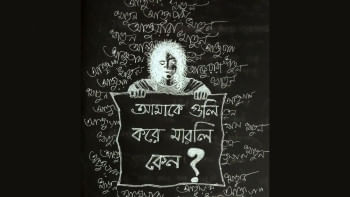
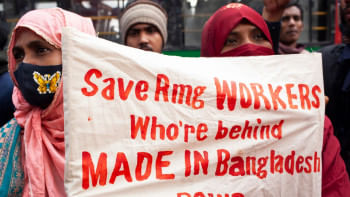
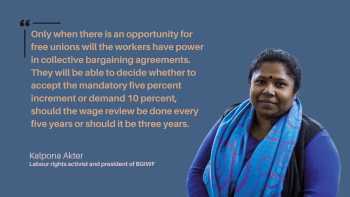



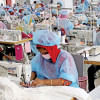

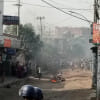

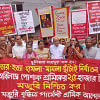


Comments